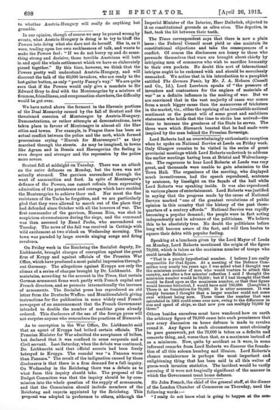The Times correspondent says that there is now a plain
issue : the Federal Council must yield or else maintain its constitutional objections and take the consequences of a conflict. Of course the disclosures are honey to those who
persuade themselves that wars are brought about chiefly by intriguing men of commerce who wish to sacrifice humanity to their own pockets. No doubt this sort of international intrigue ought to be reckoned with and should be mercilessly unmasked. We notice that in his introduction to a pamphlet entitled The German Panic, by Mr. J. A. Hobson (Cassell and Co., id.), Lord Loreburn speaks of "the pressure of inventors and contractors for the engines of materials of war" as a definite influence in the making of war. But we are convinced that in the vast majority of cases war comes from a much bigger cause than the manceuvres of tricksters in the market, viz., either the uprising of an irresistible national sentiment or the potent will of some great and ambitious statesman who holds that the time to strike has arrived—the time to increase the greatness of the State he serves. The three wars which Bismarck boasted that he had made were inspired by the man behind the Prussian Sovereign.


























































 Previous page
Previous page